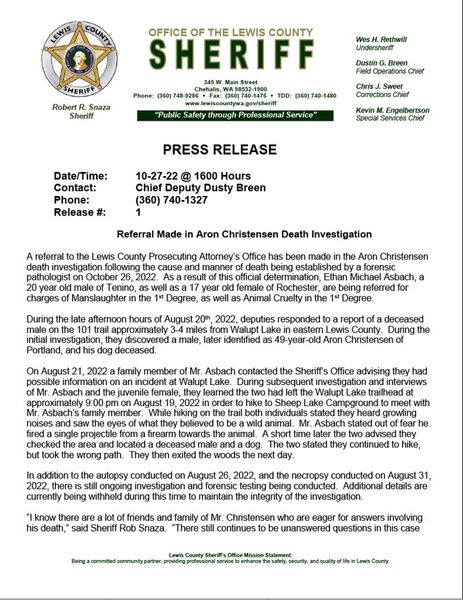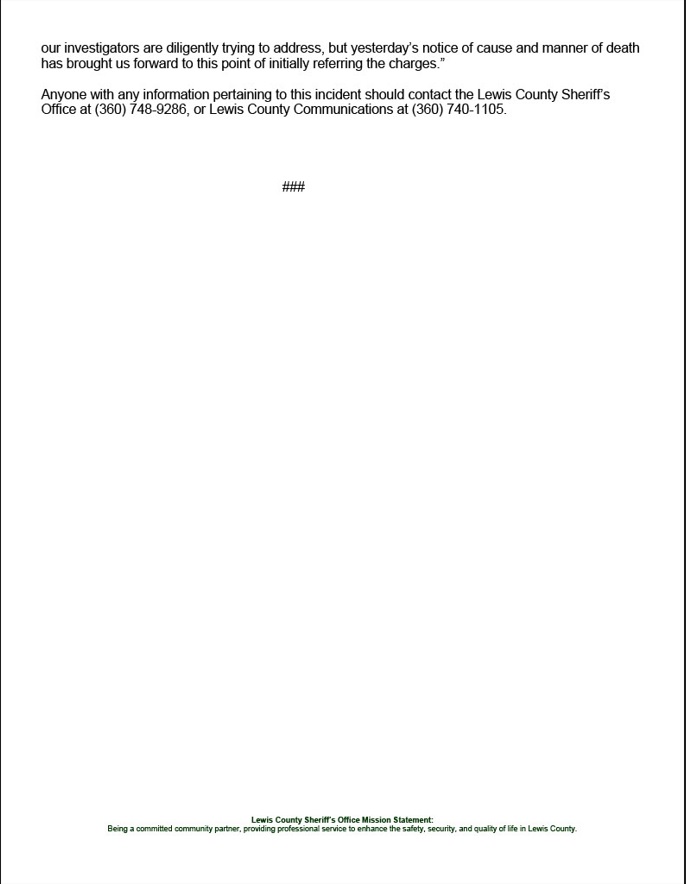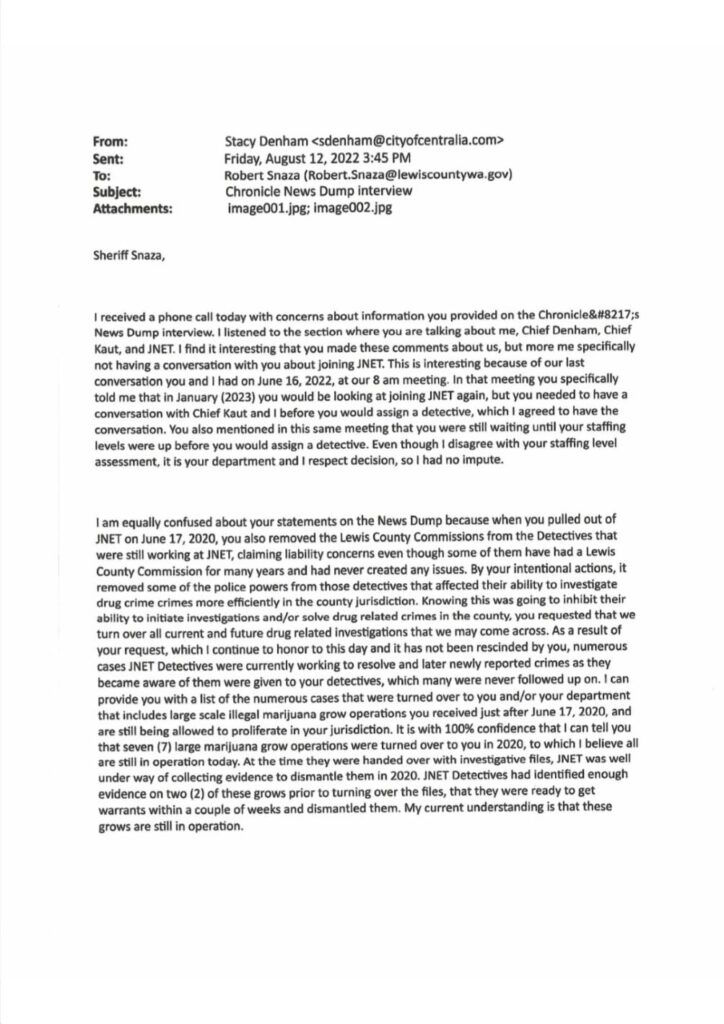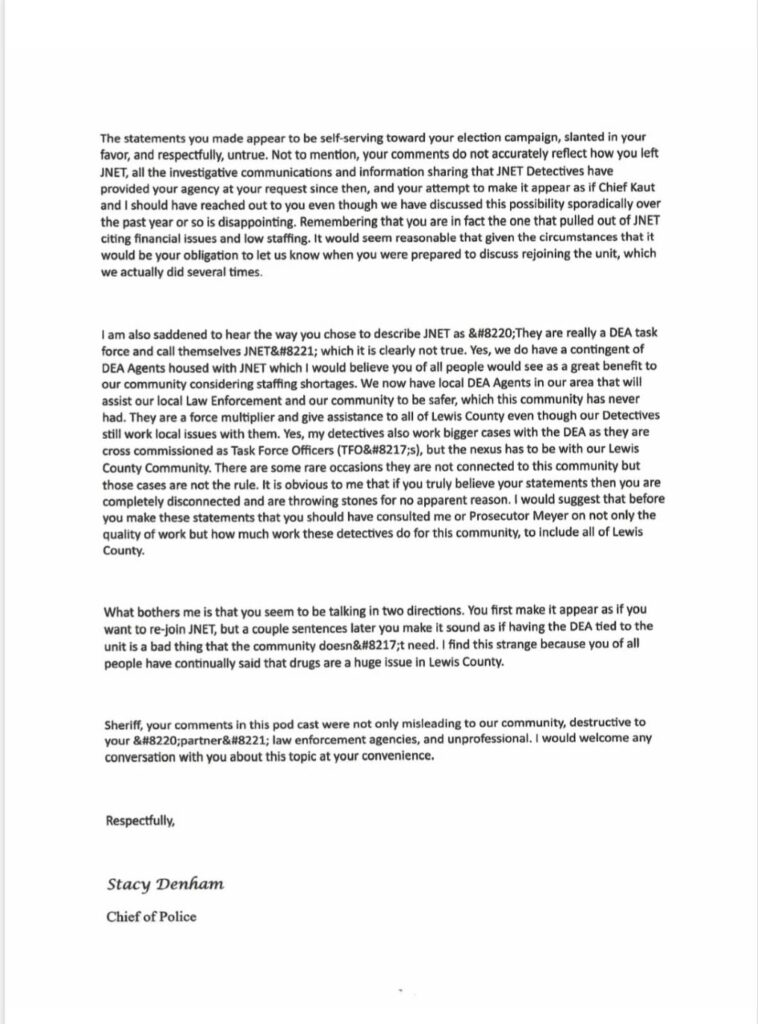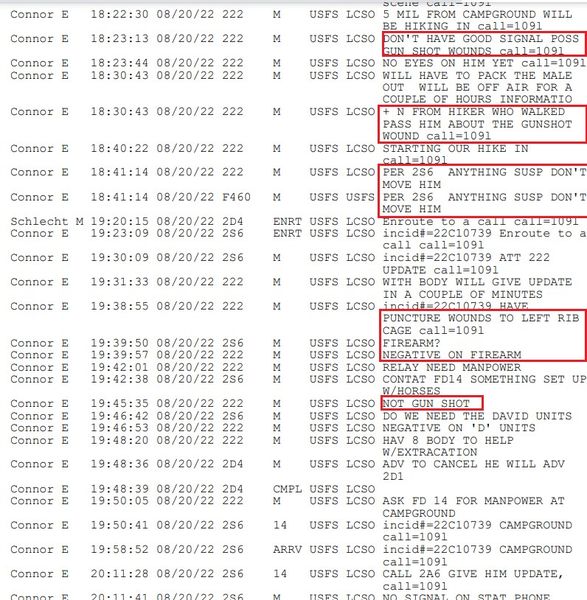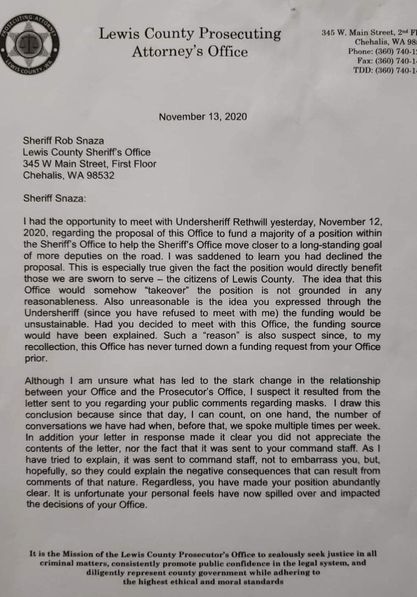
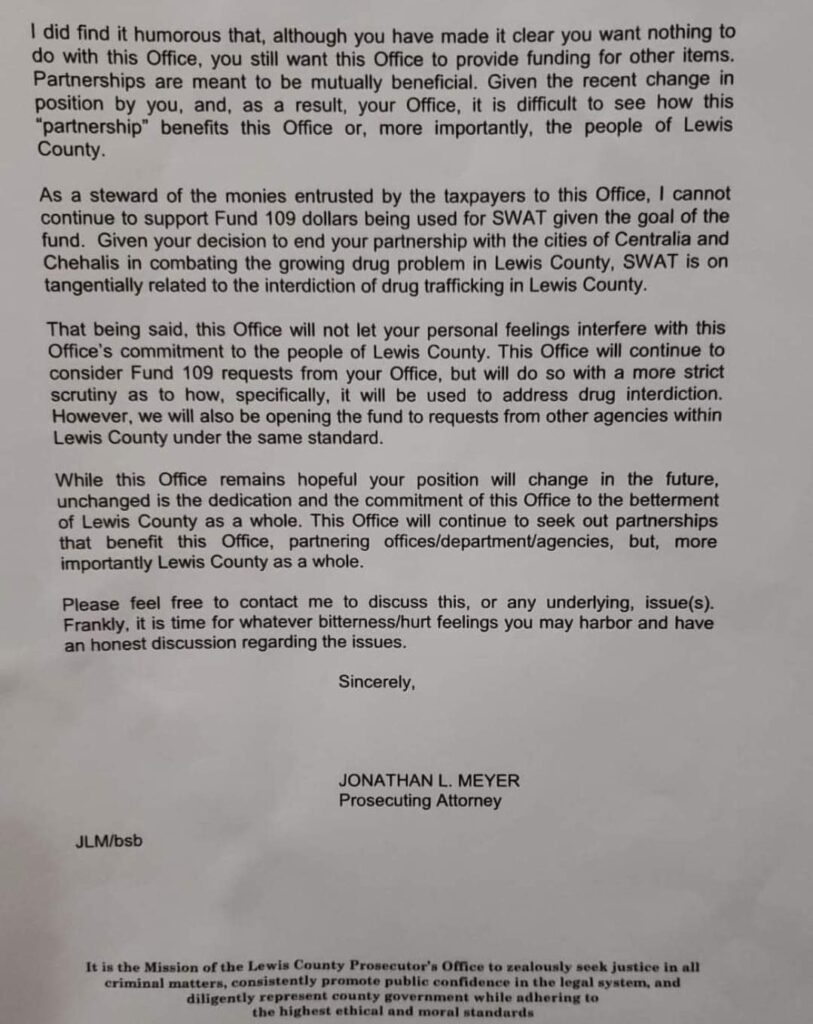


Letter from Retired Chief Carl Nielson to Chief Denham
October 14, 2022
Stacy,
Thank you for reaching out to me regarding Sheriff Snaza’s recollection about JNET. While you were privy to the vast majority of the decisions regarding the team that ultimately became JNET, I’ll be happy to provide a little more insight and clarification for you. While I was originally going to simply respond directly to your email, I quickly found the information growing and believed it would be better to do it as a separate document and attach it for you.
JNET History
· February 2015
As an applicant for the Centralia Police Chief’s position, I met with (then) Chehalis Police Chief Schaffer and Sheriff Snaza to get a better feel for what I would potentially be stepping in to as Centralia’s new leader. During my meeting with the Sheriff, he notified me that he and Chief Berg had entered into an agreement to have a combined SWAT team. Sheriff Snaza asked me if I would be supportive of that team should I be selected for the position. I told him that I was extremely supportive of combined teams and that with the proper leadership and oversight, was the most prudent manner for small agencies to accomplish large goals.
· June 2015
I came to Centralia in mid-May of 2015 and spent two (2) weeks with Chief Berg so my transition to Chief within that organization would be as seamless as possible. That time was well invested as it gave me the opportunity to evaluate most of the department’s operations and areas that I believed needed have a closer look. As you are completely aware, I began making changes my first full day as Chief by demoting one of the two Commanders. It was that day that you graciously agreed to fill the interim Commander’s position that I had just created.
Since an issue was discovered shortly thereafter with the other Commander, this provided the opportunity for you to begin working directly with me in assessing things within our organization. Having worked in or around narcotics investigation units for nearly all of my career, I was fully aware of the potential liability surrounding such units if they are not properly run and/or supervised.
With your experience in working in the Unified Narcotics Enforcement Unit, we quickly began finding areas within our Anti-Crime Unit that needed correction. As a reminder, when I arrived, our agency’s Anti-Crime team consisted of one (1) Sergeant (Brian Warren), two (2) Officers (Adam Haggerty and Chad Withrow) from our agency, one (1) Detective (Robin Holt) from Chehalis PD and one (1)
crime analyst from the Department of Corrections (which had essentially become a part-time spot by the time I became Chief).
We quickly identified and began implementing the following changes to that unit:
· Asset Seizures
As you are fully aware, the RCW supports and authorizes agencies to seize property (assets) that have a nexus to criminal behavior. This most frequently occurs as the result of narcotics investigations. The spirt of the law is (in general terms) to allow agencies to dismantle criminal enterprises by seizing proceeds (money and/or property). It allows those agencies to utilize either the items, or the proceeds from the sale of those items, for narcotic related training and equipment. We both fully recognized that this is a tremendous tool for law enforcement agencies, but left unchecked, can become a nightmare for law enforcement executives.
Upon my arrival, Chief Berg proudly talked about the monies that were in Centralia’s Asset Seizure account. But what I found concerned me – the fact that it appeared the only drug dealers we were targeting were the ones who had the most potential assets to seize.
o New directive to the team was to focus on drug and/or gun related criminals, regardless of the level of dealing and with no regard for their assets
Also concerning was the items the team was actually seizing (a pair of basketball shoes was the catalyst for this) and the allowing of the criminal suspects to purchase their seized items back and/or make payments to the City.
o New directive to the team was to seize only items that they could prove were assets attained by the suspect through their criminal dealings. Additionally, we immediately stopped the practice of what I called “Let’s make a deal” where the criminals could buy their assets back.
I quickly discovered that our seizure reports frequently lacked documentation to support the nexus to the criminal proceeds of the suspect.
o New directive to the team was to either properly document the nexus to seize the property, or the seizure would not be approved.
This change also greatly assisted our City Attorney to properly prepare for Seizure Hearings.
The RCW outlines who can preside as the Hearing Examiner for Seizure Hearings. While it clearly allows for a Police Chief to hold that position, I found that fact that Chief Berg was the Hearing Examiner for cases involving our Anti-Crime unit didn’t pass the “eye test” as being completely impartial during the process.
o While it is no secret that Chief Berg and I never saw eye-to-eye on leadership styles or decisions, I have never questioned his veracity. However, to eliminate any perceived conflicts moving forward, it was decided that the City would contract with the Honorable Jim Buzzard (a practicing attorney and presiding judge) for all future Seizure Hearings.
· Operation Orders
We found these to be seriously lacking information; specifically related to officer safety.
o New directive to unit and Sergeant Warren was to properly document plan (with the emphasis on officer safety) and receive approval well in advance of potential operations.
· Use of seized vehicles as unit transportation and operations
o I had never heard of such and idea and as soon as you and I discussed the potential officer safety issues by doing so (especially in such a small community), you were tasked with creating the agreement that I believe is still being utilized by the unit.
· July 2015
Our Anti-Crime team had been frequently working with Homeland Security Investigations (HSI) on narcotic cases coming into and through our community. As a direct result of the success our team was having with HSI, the Centralia Police entered into a Memorandum of Understanding that authorized our officers to perform certain HSI duties.
During this time period, I had frequent calls and/or meetings with Chief Schaffer regarding the changes we were making to the unit. I wanted to be sure he was comfortable with the direction we were moving the team. He was fully supportive and while he understood the majority of the cases would be in or around Centralia, he asked that we ensured that crimes in or around Chehalis were dealt with as well.
Over the first several months of my term as Chief, Sheriff Snaza, Chief Schaffer and I would meet for monthly breakfasts as well as seeing each other at various meetings around the county. I openly discussed the changes that we were making within our
organization, including the new direction we were giving to our Anti-Crime unit. As you can recall, at that time the Sheriff’s Office was running its own dope investigations with I believe only one (1) Detective (Duke Atkinson). It was during this time that Sheriff Snaza asked if I would consider allowing his detective to become part of the Anti-Crime unit.
While I was, and still am, fully supportive of agencies combining resources, I brought this idea back to you for your input. It was during these discussions that you (and others) cautioned me about involving LCSO and specifically Sheriff Snaza in our Anti-Crime team. The consistent message I received from you and others dealt with incidents that had occurred at the Unified Narcotics Enforcement Unit in Lewis County. Specifically, the questionable use of seizure funds by the Sheriff’s Office and (then) Sergeant Snaza’s lack of investigative experience, his desire for short-term investigations, rather than allowing those working for him to take a case to its actual potential, and overall meddling with investigations being conducted. The concern that you and the others I spoke to about it was how involved Sheriff Snaza would be in the new unit and either he or his staff undermining the new goals outlined to the unit (concerns that later came to fruition over the years).
· August 2015
While, I clearly heard and understood the concerns, I fully believed that they would be mitigated since we had both direct supervision and Command oversight of the unit. Therefore, Chief Schaffer and I accepted Sheriff Snaza’s offer and Detective Atkinson was allowed to join the unit – and the name was changed to the Joint Narcotic Enforcement Team. As this locally funded team was being formed, the Lewis County Prosecutor’s Office also came on-board as a partner and agreed to prosecute the cases generated by the unit. During this transitional period, you helped me craft the first Joint Operational Tasking Order
· September 2015
On September 10, 2015, the first Joint Operational Tasking Order was signed by Chief Schaffer, Sheriff Snaza, and myself. This outlined the agreed mission and guidelines that the combined unit would be working under.
**You should have a copy of this agreement in the in the files I left with you
· October 2015
You and I finalized the JNET Policy and Procedure Manual, which was agreed upon and signed by all involved agency heads.
From that point on, JNET continued to evolve. You and I identified the need to recognize our staff on the unit as Detectives and worked with the Teamsters Union and Human Resources to make that happen. The team quickly had outstanding success in
large- and small-scale investigations throughout the state – but ALWAYS with a nexus to our county.
We faced challenges along the way, but most were quickly identified and resolved. And while I recognize that I made the ultimate decision (and still believe it was the right one), the concerns that you and others had warned me about regarding the Sheriff and his office frequently showed and had to be dealt with – some over and over again. The ones that I can remember include:
· The Sheriff Detectives assigned to the unit
Ø Detective Atkinson – good worker, but not a team player that is crucial in a small, high producing unit
Ø Detective Schlecht (sp?) – good team player, but not a productive narcotics detective. He was also challenged and I believe greatly limited in his potential when Sheriff Snaza decided to enter into an agreement with the US Marshall’s Office, which required Detective Schlecht to be away from the unit as required by the Marshall’s Office. Additionally, I always believed that the Sheriff was never a fan of Detective Schlecht based upon the fact that he was constantly asking about his work productivity and fit in the unit.
Ø Detective Jacobo (sp?) – good worker, good team player, but essentially a brand-new deputy. I still believe she had the best potential to be an asset to the unit, but was removed from the Sheriff prior to that.
· Asset Seizures
Ø Throughout my time having oversight of JNET, this was a constant struggle with the Sheriff demanding his share of seizure funds from the unit, even if his Detectives were not in the unit at the time.
Ø This became a real challenge when the Sheriff’s Canine Team responded to assist with a potential load vehicle for DEA. While at the scene, the DEA case agent told the handler that the DEA would split any potential seizure funds 50/50 with LCSO. However, neither the DEA agent or canine handler were authorized to make such a deal. Additionally, one of our JNET Detectives had been working with the DEA on this case, so it fell within the purview of the guidelines set forth within the agreed upon and signed JNET Joint Operational Tasking Order.
Ø While not a direct concern of our agency, you and I did begin to notice the Sheriff spending seizure funds for non-narcotic related purposes. I didn’t agree with the expenditures while they were happening and I’m still not
sure those expenditures would stand up to an audit, but I guess nothing is outside of the lines until you get caught.
· Sheriff Constantly Requesting Case Updates
Ø While this on face value seems like a simple request, Sheriff Snaza would consistently insist to be updated on cases and want to get into the minutia of those cases.
Ø This frequently became an issue for Sergeant Warren and the team, because they would have to stop what they were doing in order to answer the Sheriff’s question.
Ø We finally resolved this by making you the point-of-contact for the Sheriff to reach out to with any questions he had.
· Lastly and this was probably the most frustrating one for me was the Sheriff and his Command Staff regarding rumors about JNET personnel
Ø Undersheriff Rethwill and Chief Deputy Sweet both worked for the Washington State Patrol prior to being hired by Sheriff Snaza.
Ø Both also worked in and around Narcotics Task Forces during their tenure with the State Patrol, thus giving them connections throughout the state.
Ø On several occasions Sheriff Snaza contacted us about rumors his staff was hearing about one of our JNET Detectives.
Ø We would have meetings to discuss the rumors and would frequently be told by either Rethwill and/or Sweet that they didn’t want to name who they heard it from, but the rumor was concerning. Each time it turned out to be the same issue being brought up by narcotic detectives who were frustrated that one of our Detectives had resolved a case in their area and they had not been a part of the arrest or case – essentially making them look bad.
Ø The most frustrating thing for me regarding this, is that even though we would seemingly resolve the issue and ask the Sheriff and his Command Officers to vet such rumors prior to bringing them to our attention, that request appeared to fall on deaf ears. I fully believe that if you are not part of the solution, then you become part of that problem – which created unneeded and unwarranted stress within the unit.
I’ll be the first to admit that I made mistakes throughout every level of my 35-year law enforcement career. But I am also extremely proud of the many accomplishments that I was able to achieve during that time. There’s a Greek Proverb that I heard and now
have a sincere appreciation for. It says, “A society grows great when old men plant trees whose shade they know they shall never sit in.” This rings true for me when I consider the many people I had the privilege to mentor and are now in leadership positions in law enforcement up to and including Chief of Police.
JNET is another accomplishment that I am proud to say I helped create. The fact that it has continued to evolve into the unit it has become, speaks volumes for us putting the right people into the right places to achieve their given goals! I have only known two (2) Sergeants leading JNET. Sergeant Warren did an outstanding job during his tenure and continually helped the unit evolve, no matter how many times things were changed. Sergeant Murphy took the challenge we set for him and has guided JNET to the levels it now achieves; receiving recognition throughout the State and Country.
While primarily a narcotic investigation team, I know for a fact that JNET has frequently been asked and responded without hesitation to help solve other crimes in and around our community. Ranging from burglaries to homicides, JNET Detectives work diligently to solve crimes – and unless specifically requested and authorized, ALWAYS ensuring there is a nexus to the Centralia community.
As a sitting Chief of Police, I was required to stay a-political. With retirement comes freedom to speak my mind and correct misrepresentations. Your email that prompted this recap of the history of JNET asked about a quote from Sheriff Snaza at a recent debate. Sheriff Snaza apparently said, “I’m the one that helped create JNET. It started out as an idea. I talked to Chief Berg and it morphed into JNET.”
I know that Sheriff Snaza is still upset that I pulled our agency out of the Regional SWAT team prior to my retirement, which may explain why he’s using Chief Berg as a reference in this quote. And while the current Sheriff is correct that he was one of the three original law enforcement executives who signed the original Joint Operational Tasking Order, what he is inferring in his quote is that JNET was his creation and idea. As you can see by the information I provided, that is simply not true.
Interestingly, a Centralia Police Officer who had been fired and the City was forced to re-hire, prior to my arrival was put on the Brady List by Lewis County Prosecuting Attorney Jonathan Meyer for providing less than accurate information. If this is the kind of information that Sheriff Snaza is or has been putting out to his constituents, perhaps it is time for him to retire and a new Sheriff be elected to replace him. One who can provide accurate information to the community they are sworn to serve and protect.
I know it hasn’t been all roses during your time as Chief, but you should be proud of what you have been able to accomplish so far; especially the new heights that JNET has been able to achieve under your guidance and that of your staff! As always, you know how to contact me should you want any clarification about this or anything else.
Carl Nielsen
